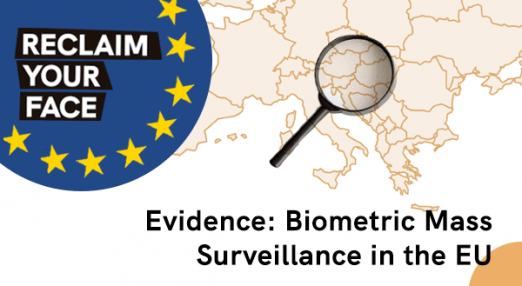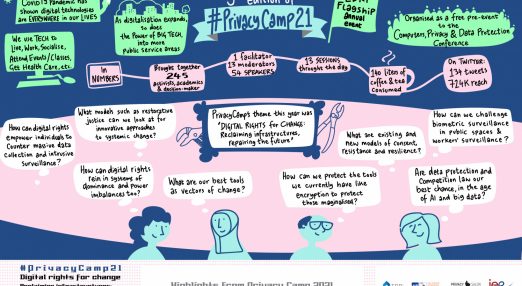EDRigram
Filter by...
-

Creating Conditions for a Decolonised Digital Rights Field
Since 2019, DFF and EDRi have been working to initiate a decolonising process for the digital rights field. Reflecting on the increased challenges to our digital rights, we realised how imperative it is that the field truly reflects everyone in European society. This means improving representation in the digital rights field, but more crucially undoing the power structures preventing us from protecting digital rights for everybody.
Read more
-

EDRi-gram, 7 April 2021
Reflecting on the increased challenges to our digital rights, we realised how imperative it is that the field truly reflects everyone in European society. This means improving representation in the digital rights field, but more crucially undoing the power structures preventing us from protecting digital rights for everybody. Approaching digital rights through the lens of decoloniality invites us to interrogate how digital space is occupied, the people who are displaced, and the mechanisms of extraction it requires to exist. This process requires extra work, extra care, extra patience, extra humility as we interrogate that what seems natural.
Read more
-

Everyone wants to encourage encryption, except for one minister
The Department of Justice and Security in the Netherlands seems to be holding on to the idea that it is possible to weaken encryption "just a little". Simultaneously, the parliament and a monster alliance of organizations tells the minister over and over again: it's impossible. EDRi's member Bits of Freedom sheds some light on the on-going debate on the question.
Read more
-

Why the electronic green vaccination certificate creates new problems instead of solving them
The National Council in Austria passed a legal basis for the electronic immunity certificate project within two days, skipping any kind of review procedure. The digital passes are not a ticket to a normal life, vaccination is. So, special attention should be paid to maintaining the trust of people and the voluntary nature of vaccination, ensuring that people's rights to privacy and freedom of choice are respected. EDRi's member epicenter.works explains what are the concerns with the deployment of green certificates and suggests alternatives to this project.
Read more
-

Stop Spying on Asylum Seekers!
How would you feel if the government was literally able to cut off your access to your cash, because your buying habits were deemed suspicious? That's the reality for many UK based asylum seekers, spied on by the Home Office through their 'Aspen Card', the debit payment card they rely on for their basic subsistence and survival. Join our member Privacy International in their efforts to stop the government's harmful practices of spying on some of the most vulnerable members of our society.
Read more
-

Campaign against surveillance: Nobody will tell you when they will follow you
The rapid growth of new technologies has been of “benefit” to secret services. However, it seems that the law has lacked behind showing its inability to reflect the new methods of surveillance used by secret services around the world. EDRi's member Panoptykon Foundation has launched a campaign in Poland to show the problem of unscrutinised powers of secret services.
Read more
-

The EU should regulate AI on the basis of rights, not risks
EDRi's member Access Now explains why the upcoming legislative proposal on AI should be a rights-based law, like the GDPR. The European Commission must not compromise our rights by substituting a mere risk mitigation exercise by the very actors with a vested interest in rolling out this technology.
Read more
-

Trust is a two-way street: the UK’s digital identity framework
Trust is a two-way street, and while the British government’s digital identity trust framework definitely makes steps in the right direction, those efforts need to be accompanied by a commitment to transparency and integrity, says EDRi's member Open Rights Group in response to the government's policy paper on UK’s digital identity and attributes trust framework.
Read more
-

Delete first, think later
The proposed Digital Services Act wants to push online platforms to quickly remove illegal content. But it uses a sledgehammer on a most intricate challenge: moderating online speech. The result would crush freedom of expression instead of enabling it. This is the second blog post in a new series dedicated to the EU’s proposed Digital Services Act and Digital Markets Act.
Read more
-

Italy proposes age verification and digital identities for accessing social media
EDRi member Hermes Center sheds light on the current case against TikTok in Italy, where three solutions are circulating on how to make sure that children will not access certain online contents unless supervised by their guardians.
Read more
-

Shedding light on the DWP staff guide on conducting fraud investigations
In 2019, the UK Department for Work and Pensions published their two-part staff guide on conducting fraud investigations. Privacy International went through the 995 pages to understand how those investigations happen and how the DWP is surveilling benefits claimants suspected of fraud.
Read more
-

EDRi-gram, 10 February 2021
This edition of the EDRi-gram is jam packed full of national and European insights and examples on how our data and tech is being misused by those in power and what we must do about it! In this edition we showcase another example of how governments in Europe are using discriminatory biometric technologies against marginalised groups. We expose how Big Tech continues to make big profit by expanding into the public sphere, share why breaking encryption would hurt children and adults alike and much more.
Read more
